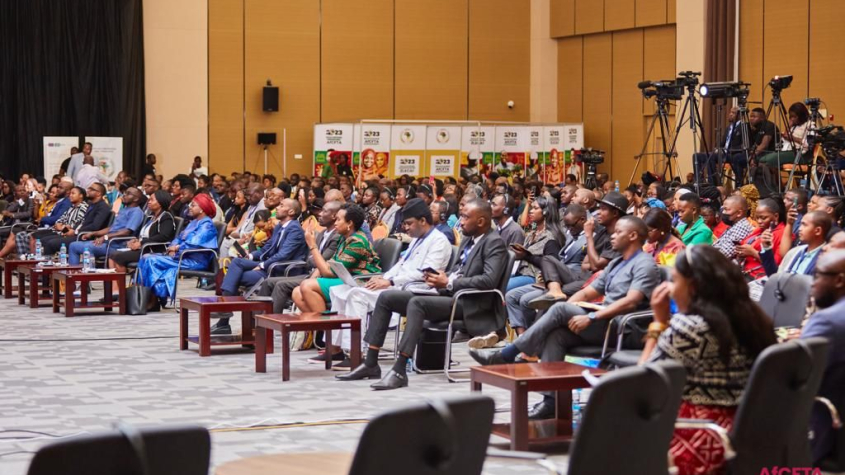IN-DEPTH | AfCFTA Youth Symposium: Igniting the Future of Youth in Intra-African Trade
Between August 21st and 23rd, the secretariat of the African Continental Free Trade Area (AfCFTA), in collaboration with the Government of Zambia, hosted the inaugural AfCFTA Youth Symposium (AfCFTAYS2023) in Lusaka, Zambia.
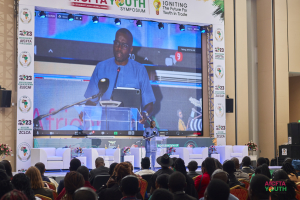
Africa’s youth population is projected to reach 1.3 billion by 2100, almost half the world’s youth population at the time. Already, the continent is grappling with staggering youth unemployment rates. If empowered, the sheer creativity and ingenuity of this humongous population of young people could translate into a prosperous continent as envisioned by the AU’s Agenda 2063.
For the AfCFTA to succeed, it has to create a favorable environment for young people to actively participate in the enhanced intra-African trade ushered in by the Agreement. In response to widespread advocacy for youth mainstreaming in the AfCFTA’s implementation, the AfCFTA Secretariat introduced a youth component in the hitherto Protocol for Women in Trade, now known as the Protocol for Women and Youth in Trade.
As part of consultations on the Protocol (currently under negotiation) as well as to explore the potential benefits of youth participation in intra-African trade, the Secretariat and the Government of Zambia, among others, hosted the Inaugural AfCFTA Youth Symposium (AfCFTAYS2023) in Lusaka, Zambia. Themed “Igniting the Future of the Youth in Trade in Africa”, the convening was a youth-centric platform where Africa’s youth engaged policymakers and development partners on their crucial role in the AfCFTA.
The Symposium afforded youths a platform to exchange ideas on an inclusive trade environment in the AfCFTA era and proffered actionable recommendations for effective youth inclusion in the AfCFTA, at national, regional, and continental levels. The conference helped youth from across Africa deepen their knowledge of the AfCFTA as an engine for equitable and sustainable growth and define their role in the future of intra-African trade through entrepreneurship and innovation.
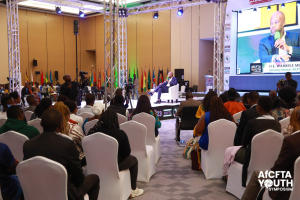
“AfCFTA to transform Africa’s youth bulge into a demographic dividend” – SG
Mr Wamkele Mene, Secretary General of the AfCFTA, while delivering the opening remarks, said that every year, 11 million Africans enter the labor market who are unable to find jobs, as the continent creates only 3.7 million jobs annually because Africa’s economic growth has not been robust and inclusive enough to absorb its growing labor force and significantly reduce poverty.
Mr Mene, who was represented by Mr Prudence Sebahizi, Director for Institutional Matters and Programmes Coordination at the AfCFTA Secretariat, said recent World Bank estimates showed real income gains from full implementation of the AfCFTA could reach US$571 billion by 2035, just as it would contribute to lifting 50 million people from extreme poverty, hence the Protocol on Women and Youth in Trade to facilitate greater trade opportunities for women and youth under the AfCFTA.
The AfCFTA chief described the Agreement as a clear manifestation of Africa’s continued efforts to transform its youth bulge into a demographic dividend for the sustainable development of the continent. To this end, he called for youth-friendly policies by AfCFTA State Parties so as to foster innovation, Inclusion and Integration as crucial mechanisms to propel growth and generate much-needed decent jobs for African youths.
“Currently, the gap between those who have access to digital technologies and content and those who do not is widening. Women and young people, particularly in rural and poor areas, are the most vulnerable to digital exclusion in Africa. The AfCFTA provides more digital trade, which means more jobs for the teeming, youthful African population, providing them with a higher quality of life, which is the Africa we want,” Mr Mene assured.
The AfCFTA SG therefore called for inclusive access to digital technology and value chains, which he said were key to integrating African countries into one major market and scaling up the movement of goods and people, as well as an opportunity to mobilize African youths into self-employment. In this direction, he said the AfCFTA Protocol on Digital Trade, when concluded, will facilitate cross-border e-commerce transactions.
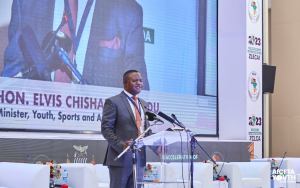
“Youth unemployment source of political, social strife” – President Hichilema
In his keynote, Zambian President Hakainde Hichilema (represented) described high levels of youth unemployment as a major source of political unrest and social strife among many African countries, leading to perilous attempts by African youths to cross the Mediterranean Sea to Europe. President Hichilema said social strife and the quest to escape Africa have robbed the continent of many of its agile youths and further exacerbated poverty levels on the continent.
Therefore, the Zambian president expressed confidence that improved market access under the AfCFTA, coupled with a stable socio-economic environment, will enable Africa to attract much-needed investment in crucial sectors such as manufacturing, which is vital for job creation. “I am confident that the AfCFTA Secretariat will do its part to develop Continental Programmes that are aimed at promoting regional infrastructure that facilitates trade and investment in Africa, beyond the reduction of tariffs.”
President Hichelema urged the Secretariat to facilitate the speedy completion of outstanding AfCFTA negotiations and operational instruments to make the Agreement fully operational for the youth to maximally benefit from its market access opportunities. “The Secretariat should also consider developing a continental project for youths that would form part of the [AfCFTA] Guided Trade Initiative (GTI). This will enable the youths to have a foothold in the implementation of the AfCFTA when it is fully implemented.”
The Zambian president said his government has embarked on various initiatives to bridge the most prominent barriers against young people’s full participation in economic activities, namely access to finance and employment opportunities. This, he said, was aimed at enhancing youth participation in international trade, including under the AfCFTA.
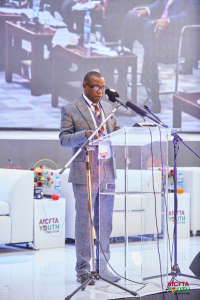
“African govs should create environment for SMEs growth” – Mr Mubangaa
In a separate remark, Mr Elias Mubangaa, Minister of SME Development of Zambia, urged African youths to embrace economic opportunities in the areas of innovation, technology, the arts and science. He described the SME sector as a crucial one, while the AfCFTA as an opportunity to develop a new breed of international African entrepreneurs that will change the landscape of intra-African trade.
To this end, Mr Mubangaa called on African governments to provide the desired support for the growth of SMEs and youth entrepreneurs, which will enable them to provide goods, services and products that will meet the needs of African consumers, underscoring the importance of creating an enabling environment that would place SMEs and entrepreneurs at the forefront of entrepreneurship and economic development in Africa.
“Africa is blessed with a lot of natural resources, but when we extract our raw materials, they end up in other countries for value-addition, and then we import [the finished products], which causes unemployment to rise because the aspect of value-addition is absent. The ministries of SMEs and relevant ministries across other [AU] member states should support technology and innovation so that we can start adding value to our natural resources,” the minister urged.
Minister Mubangaa ended his remarks with a call to action: “The time has come for the youths to roll-up their sleeves; African youths need to wake up. Therefore, I challenge you to wake up because you can play an active role on the continent by driving the economic agenda of Africa to attain our destiny. I am confident that the governments of AU member states will give the youth opportunities for networking, creating markets and peer learning opportunities.”

“91% of young entrepreneurs struggle with financial obstacles” – Youth Envoy
In her remarks, Ms Chido Mpemba, the AU Youth Envoy, noted that women and youth comprise about 80% of small businesses and cross-border traders in most African countries; hence, their contribution to their countries’ economies was not just significant but also a bedrock upon which the countries thrived, underscoring the fact that young people’s presence across markets and trade corridors was a testament to their resilience, dedication and audacity to reach beyond borders for a better life.
“As we venture into this $3 trillion [AfCFTA] market and aim to boost intra-African trade by 33% and strive to cut the continent’s trade deficit by 51%, it is imperative that the drivers of these endeavors [i.e., young people] are protected. We need a secure environment, which is a catalyst for growth as well as an environment where ideas can flourish, transactions can be conducted with confidence and businesses can expand,” urged Ms Mpemba.
The Youth Envoy decried the fact that a staggering 47% of youth-owned African businesses were grappling with financial challenges. “And this is not just a statistic but a reminder of the hurdles that overwhelm the zeal of our youth. It is a call to action, urging us to ensure that the promise of the AfCFTA does not bypass those who are struggling. A striking 91% of these young entrepreneurs are seeking avenues to overcome these financial obstacles; their determination is unwavering, and they are undeterred.”
Ms Mpemba said the Youth Symposium presented a unique platform “where a shared commitment to protect, empower and amplify” the contributions of African youth in the AfCFTA was ignited. “Let us array with this unified vision, driven by the legacy of our past and the potential of our future. Let us work tirelessly to ensure that youth and young women who engage in trade are safe and enabled to flourish within the AfCFTA and the opportunities that it presents,” she concluded.
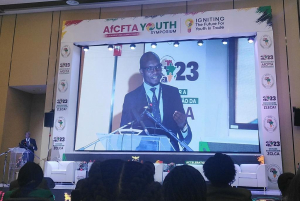
“We’re mobilizing young people to take charge of the AfCFTA” – ICOYACA
Mr Emolot Allan David, Chairperson of the Independent Continental Youth Advisory Council on AfCFTA (ICOYACA), who gave the status of youth engagement in the AfCFTA, said at the onset of the agreement, young people were not adequately involved, after which the Protocol on Women and Youth in Trade was introduced to bridge the gap and ultimately mobilize the African youth around the AfCFTA.
David said ICOYACA was subsequently founded to help African youth understand the various components of the AfCFTA as part of efforts to make young people take charge of the AfCFTA’s implementation. He, therefore, called on development partners and financial institutions to facilitate the creation of a simplified process for accessing loans for youth-owned businesses, which will make the AfCFTA not only youth-responsive but also youth-driven.
“The purpose of engaging the youth is to ensure bottom-up youth mobilization and to see to it that the message of the AfCFTA spreads widely across the continent in different languages. We began with the target of reaching 10% of African youth with our awareness campaign about the AfCFTA and going forward, this figure will be accelerated,” the ICOYACA chairperson assured.
Thanks to ICOYACA’s awareness campaign, “today, the certificate of origin that was exclusive to big corporations is now being obtained by the youths who are trading. This feat shows the power of giving youth the chance to take the lead. The AfCFTA is a means of making youth rich without having to acquire degrees and other qualifications. The only way to achieve this is by simply having quality goods and services. And by doing so, they can have money flowing into their pockets,” David explained.

“We’re leveraging youth enterprise to drive intra-African trade” – AfYBC
Among others, the Symposium featured varied panel discussions, including one on empowering African start-up ecosystems, aimed at fostering an enabling environment for young entrepreneurs and harnessing the potential of African youth in driving innovation and trade under the AfCFTA. One of the panelists, Mr Adam Alqali, Editor-in-Chief of African Newspage/VP of the Afrikan Youth Business Council (AfYBC), said the AfYBC is the leading youth-led continental private sector entity advocating youth-friendly economic and trade policies in the AfCFTA era.
Mr Alqali narrated that the Council was an outcome of the recommendations of a 2021 continental study on youth inclusion in AfCFTA conducted by YouLead Africa to advance structural inclusion of youth in AfCFTA’s implementation and recalled that the AfYBC was subsequently launched on the sidelines of the 2022 YouLead Africa Summit in December 2022 at Arusha, Tanzania, by the AU Commissioner for Economic Development, Trade, Tourism, Industry and Minerals (ETTIM), Amb. Albert Muchanga.
Mr Alqali said that for the AfCFTA to deliver on its potential, stakeholders must ensure that youth entrepreneurs are able to effectively trade under its rules. “As it is now, young people are faced with a lot of barriers, which puts them in a disadvantaged position in terms of participation in intra-African trade. One of the reasons why we founded the AfYBC was that most of Africa’s apex business bodies, such as manufacturers’ associations and chambers of commerce, lacked functional youth arms; in other words, those who benefit from these bodies are big-time entrepreneurs.”
Thus, the AfYBC VP said the Council was out to help young entrepreneurs and youth-led businesses benefit from the opportunities that the AfCFTA presents. “The Council leverages the entrepreneurial ingenuity of African youth to drive intra-African trade in goods and services, including advocating for the removal of major inhibitors to youth entrepreneurs’ participation in intra-African trade, namely non-tariff barriers, access to financing, and a lack of business skills.”
The 3-day Symposium also featured side events, workshops and masterclasses by the organizing partners, namely a workshop on the Imperative of Youth in Trade by the International Trade Centre (ITC); a Digital Skills Training by the Office of the AU Youth Envoy, as well as the Africa Youth Trade Debate Challenge. The climax of the symposium was a town-hall by the AfCFTA SG with youth delegates, during which Mr Mene fielded questions from the youth delegates.
Despite its grandeur AfCFTAYS2023 was but a step in a thousand-mile journey. For young Africans to benefit maximally from AfCFTA’s implementation, the implementers must continue to provide youth exclusive forums for young people to voice their challenges in AfCFTA’s implementation. Above all, stakeholders at continental, regional and national levels must ensure youth inclusion and eliminate all barriers to youths’ access to financing, digital literacy as well as capacity to access the AfCFTA’s boundless opportunities.

